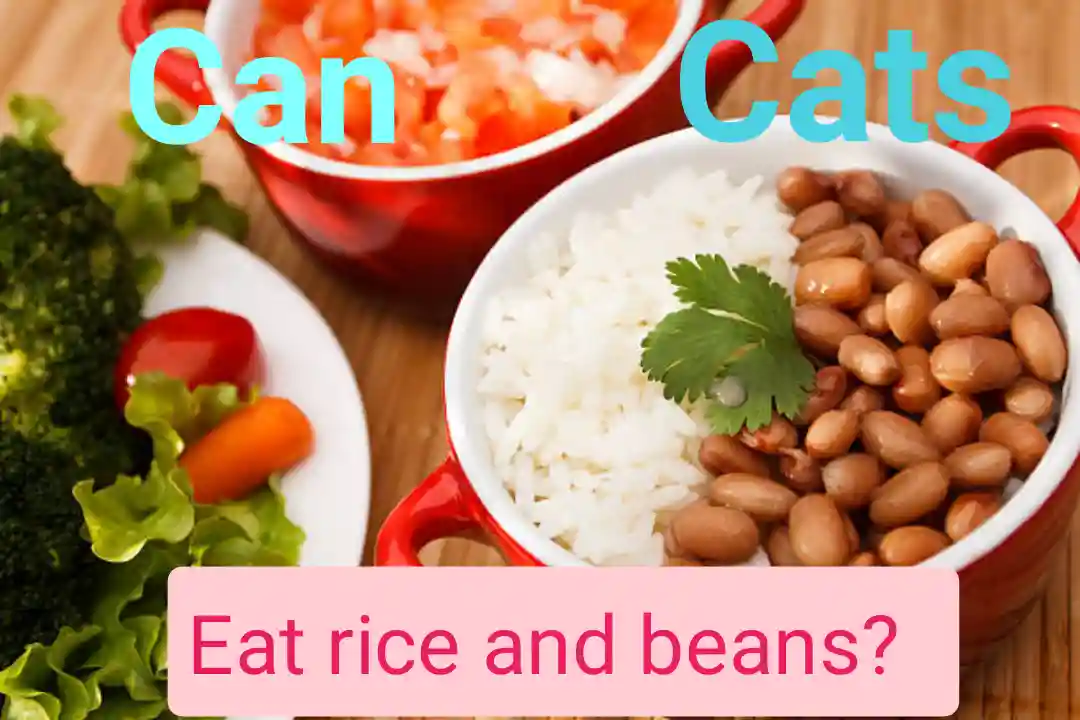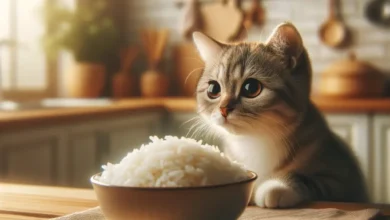Can Cats Eat Rice And Beans? +3 Alternatives You Should Know

Can cats eat rice and beans? As a feline lover, one thing you would have observed about felines(although picky at times) is their urge to eat what humans eat, but can cats eat rice and beans.
Cats require taurine and taurine can only be found in protein sources that come from animals. And it is necessary for healthy eyesight, digestion, heart muscle function, as well as a strong immune system for cats. While it’s okay for cats to eat beans and rice occasionally, their bodies were not meant to digest legumes often, which could lead to upset stomach and pains, and they can’t cater for the cats nutritional needs. This article will explore in detail everything you need to know about cats and rice and beans.
Read: Can cats eat natto?
Table of Contents
- Can Cats Eat Rice and Beans?
- Nutritional Benefits of Beans and Rice for Cats
- Potential Risks of Feeding Cats Beans and Rice
- How Much Beans and Rice Should Cats Eat?
- Preparation Tips for Cats Eating Beans and Rice
- Are There Alternatives to Adding Beans and Rice to My Cat’s Diet?
- Can cats have rice and beans? – Final thought
Can Cats Eat Rice and Beans?
Cats can eat beans and rice but not in the same proportions. Yes, cats can eat beans—with caveats, which we’ll cover below. However, beans aren’t a “protein powerhouse” for cats as they are for humans.
While beans are full of protein, it’s not the protein your cat needs. Cats are obligate carnivores, meaning they require specific nutrients that can only be supplied through the ingestion of animal protein.
While human vegetarians can substitute protein sources such as beans and lentils for animal meat, this isn’t possible for cats. That said, beans don’t necessarily pose a hazard for your cat—as long as the beans are served plain, cooked, and only as an occasional snack.
When in doubt, talk to your veterinarian first if your cat has specific medical conditions (such as pancreatitis ) that could be exacerbated by eating beans.
Rice on the other hand can be eaten by cats but in small amounts. It’s non-toxic, so it won’t harm them to have a bit in their food, but you shouldn’t give too much as it’s not an essential part of their diet. If you’re feeding your cat a complete and balanced cat food, they won’t gain additional nutritional benefits from eating rice alongside. Plus, too much of this filler may stop them from eating enough of the healthy diet they need!
Nutritional Benefits of Beans and Rice for Cats
Think of rice as a good staple to have in a balanced cat food product, but other ingredients are also recommended, providing the remaining nutrients your cat needs to be happy and healthy.
The nutritional benefits of rice for your cat depend on the way rice is produced. Let’s take a look at the differences between brown rice (whole grain) and white rice (processed).
Brown Rice vs White Rice
Brown rice is known to be healthy for humans and pets alike because it’s a “whole” grain that retains all three edible parts (specifically the bran, germ, and endosperm). It also contains a multitude of nutritional benefits important to your cats’ health they include:
- Fiber
- Protein
- Vitamin B1 (thiamine)
- Vitamin B6 (pyridoxine)
- Iron
- Magnesium
The biggest difference between brown and white rice is how they’re processed for consumption and how many nutrients they contain.
As the Harvard University School of Public Health explains, because brown rice remains intact in its true form, it contains higher amounts of these naturally produced vitamins and other nutritious ingredients.
White rice, on the other hand, has been stripped of its essential nutrients during the milling process. Vitamins and iron are often added to the polished grain, which is then referred to as “enriched” white rice.
While plain rice is safe for cats, it doesn’t provide any nutritional benefits, says Dr. Rachel Barrack, DVM, CVA, CVCH, and owner of New York City-based veterinary practice Animal Acupuncture. That’s because.
* Cats are obligate carnivores, meaning they benefit from high-protein diets.
* Felines have very limited carbohydrate needs. That’s true for most cats, so plain rice—being a carbohydrate—doesn’t have much of a health payoff for kitties.
* Cats can have difficulty processing and digesting carbs, like rice. Plus, eating too many carbohydrates can predispose purr babies to conditions like obesity and diabetes.
Although brown rice is proven to have more nutritional value than white rice both shouldn’t form the main diet of our feline friends
However, beans is a source of protein and fiber but should not be the major constituent of your cat’s meal. Cats need a diet rich in protein, and fiber is essential for a healthy digestive system and to prevent constipation, but with an emphasis on animal based protein.
Beans also provide many vitamins, minerals, and antioxidants. Cats are obligate carnivores and should mainly eat animal protein, but small amounts of beans can provide some nutritional value.
Potential Risks of Feeding Cats Beans and Rice
As an obligate carnivore, your cat’s digestive system is well-equipped to process meats but not much else.
Humans can benefit from the nutrients and proteins found in beans, but a cat’s digestive system cannot process these the same way we do.Feeding beans to your cat could cause stomach troubles like vomiting, gas, and diarrhea.
Plain, cooked beans are the safest to share with a cat. Never feed raw beans or those that contain added salt, sweeteners, or spices, such as baked beans, canned beans, and refried beans. And for rice While most cats can safely consume small quantities of rice, there are a few exceptions pet parents should keep in mind:
* Some cats are sensitive to eating new foods. If they aren’t used to consuming grains, they might vomit or suffer from digestion issues. As obligate carnivores, cats’ metabolism and gastrointestinal (GI) tracts have adapted to consuming meat so that rice can cause GI upset.
* Cats should never eat uncooked rice, as it is difficult to digest and can result in abdominal pain, bloating gas, and upset stomach. Moreover, uncooked rice can contain a natural pesticide called lectin, which can cause vomiting and diarrhea. If you notice bloating and your feline friend seems to be in pain more than 24 hours after ingesting uncooked rice, take them to the veterinarian as soon as possible.
* The carbs in rice can lead to obesity in cats. Obese felines are more likely to develop health issues like diabetes.
* If a kitten consumes too much rice too often, it might become malnourished. Sometimes, cats can feel full after they’ve eaten rice and lose their appetite for the meat that gives them their proper nutrients.
How Much Beans and Rice Should Cats Eat?
Beans and Rice should be a rare treat for cats, since too many carbohydrates in a cat’s diet can cause diarrhea, bloating, and gas.
There’s no specific table scrap measurement, but an occasional treat shouldn’t hurt. It says that when a cat’s daily diet is more than 35 percent carbohydrates, you’ll see gastrointestinal (GI) upset, says Wortinger.
Preparation Tips for Cats Eating Beans and Rice
Preparing beans and rice for your feline doesn’t require a long list of recipes intact it is as simple as making it plain. While cooked beans and rice is not harmful, you need to keep in mind that this means only cooked beans and rice. All of the other additives that humans might enjoy, such as salt or soy sauce (which is also high in sodium), might not be good for your cat.
While adding in veggies, such as carrots or peas, has nutritional value, it’s still important to talk to your veterinarian before introducing anything new to your cat’s meal
Are There Alternatives to Adding Beans and Rice to My Cat’s Diet?
Following through with a particular diet routine can become tiring and instead of beans and rice which may be eaten by our feline friend’s friends but pose potential risks to them, there is a list of other alternatives that could be added to your cat’s diet.
* Salmon: A good source of protein and omega-3 fatty acids, salmon can be a delicious and tasty treat for cats.
* Spinach: Full of vitamins and minerals including vitamins A, C, and K, iron, and calcium, spinach can be a healthy, cat-friendly treat, according to Dr. Wismer. However, if your cat has a history of calcium oxalate bladder stones, you should avoid giving them spinach.
* Another good source of protein and B vitamins, eggs are safe for your feline to eat, To reduce the risk of foodborne diseases, be sure to cook any eggs you feed your cat.
Other alternatives include bananas, oatmeal, and chicken amongst others
Can cats have rice and beans? – Final thought
On a final note, feeding your feline with beans and rice is safe but with the caveats discussed above. Considering other alternatives that pose less danger to the cats can also be a good thing for our feline friends.



